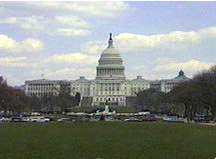Ed Bolen Testifies At Congressional Hearing Wednesday
 NBAA President and CEO Ed Bolen (pictured) appeared
Wednesday before a congressional committee to offer testimony on
the industry's ongoing work to enhance aviation safety, including
for on-demand operations.
NBAA President and CEO Ed Bolen (pictured) appeared
Wednesday before a congressional committee to offer testimony on
the industry's ongoing work to enhance aviation safety, including
for on-demand operations.
Bolen testified before the House Transportation and
Infrastructure Committee's Subcommittee on Aviation, where he was
joined by other industry leaders. Wednesday's hearing was prompted
by a report from the Department of Transportation's Inspector
General regarding the Federal Aviation Administration's (FAA)
oversight of on-demand charter operators.
"NBAA commends Congress for taking a hard look at aviation
safety and continuing to work with us to build on our long-standing
safety emphasis," Bolen said.
Bolen highlighted how NBAA Members' ongoing commitment to safe
operating practices has helped the general aviation community
achieve a level of safety comparable to that for the nation's
commercial airlines. This safety emphasis, Bolen noted, has been
the driving force behind continual improvements in technology and
training, and steady declines in accident rates.
Because the hearing was focused on on-demand charter safety,
Bolen also pointed to his co-chairmanship of an industry-government
Part 125/135 Aviation Rulemaking Committee, formed in 2003, and
charged with updating safety regulations for on-demand operators,
while allowing flexibility to accomplish a wide variety of
missions. In 2005, the ARC submitted more than 140 recommendations
to the FAA addressing a myriad of issues affecting operations
including pilot training, flight duty and rest limits, FAA
oversight, and other matters.
Bolen reiterated that the ARC collaboration between government and
industry was designed to enhance charters safety, but that most of
the ARC's recommendations had yet to be implemented. "We hope that
the ARC's recommendations will be adopted as soon as possible,"
Bolen continued. "At the same time, we didn't look to the
conclusion of the ARC's work as reason to rest on our laurels when
it comes to general aviation safety, including charter safety."
 Bolen outlined several steps government could take beyond those
recommended by the ARC to further advance general aviation safety,
including the enactment of specific new and recurrent training for
the FAA's Part 125/135 inspectors, and an increased emphasis on
balancing Part 125/125 inspectors' workload with available
resources.
Bolen outlined several steps government could take beyond those
recommended by the ARC to further advance general aviation safety,
including the enactment of specific new and recurrent training for
the FAA's Part 125/135 inspectors, and an increased emphasis on
balancing Part 125/125 inspectors' workload with available
resources.
Looking to beyond the specific recommendations Bolen provided
for on-demand operations, he pointed to another long-standing
priority for enhancing aviation safety: continued transformation to
a Next Generation ("NextGen") air traffic control system. "We know
that the upgraded, satellite-based NextGen system will produce
gains for safety, and also for efficiency, carbon-emission
reduction and other priorities," Bolen said. "Although our industry
has been confronted with one of the worst economic storms anyone
has seen, we remain committed to Congressional proposals to
increase the industry's fuel tax to help support investment in
aviation system modernization because of the important safety and
other benefits it will produce.
"As we know," Bolen continued, "business aviation plays a vital
role in the nation's economy and transportation system. The
industry helps generate over one million jobs, serves towns with
little or no airline service, helps companies be more efficient and
competitive and supports people and communities in crisis. But in
order for all of those essential functions to continue, safety must
continue to be a central part of the industry's focus and planning.
"That's why there is no greater priority to NBAA and its Members
than aviation safety," concluded Bolen. "We will continue to work
with all government leaders in support of the shared goal of
keeping the U.S. aviation system the safest in the world."
 ANN's Daily Aero-Term (04.25.24): Airport Rotating Beacon
ANN's Daily Aero-Term (04.25.24): Airport Rotating Beacon ANN's Daily Aero-Linx (04.25.24)
ANN's Daily Aero-Linx (04.25.24) Klyde Morris (04.22.24)
Klyde Morris (04.22.24) Airborne 04.24.24: INTEGRAL E, Elixir USA, M700 RVSM
Airborne 04.24.24: INTEGRAL E, Elixir USA, M700 RVSM Airborne 04.22.24: Rotor X Worsens, Airport Fees 4 FNB?, USMC Drone Pilot
Airborne 04.22.24: Rotor X Worsens, Airport Fees 4 FNB?, USMC Drone Pilot




